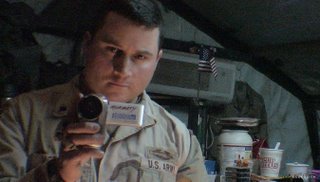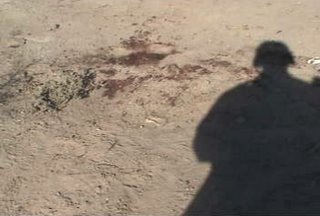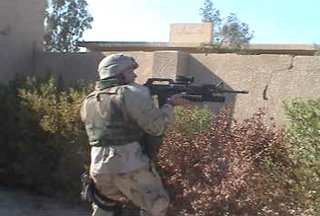
 The War Tapes (2006)
The War Tapes (2006)Director: Deborah Scranton
Are you old enough to remember when the humble home movie was something middle-class families carted out to get unwanted guests out of their homes for the evening? All one had to do was pull out that 8mm or
 16mm reel-to-reel and thread up the trip to Tampa and wait for those lingering dinner guests to scan the room for their belongings and fake a yawn. Times have changed.
16mm reel-to-reel and thread up the trip to Tampa and wait for those lingering dinner guests to scan the room for their belongings and fake a yawn. Times have changed.Today, digital imaging using small, affordable equipment has put movie making in the hands of people from all walks of life who never would have thought to point and shoot before. It has also brought a new level of intimacy, revelation, and creativity to film that is well worth paying to see. In the case of The War Tapes, the digital video images captured by three National Guardsmen from New Hampshire during their one-year tour of duty in Iraq give a you-are-there experience of real war unlike other accounts we've seen. We aren’t just getting the action footage that most of us think of as war. We’re also watching our soldiers risk their lives guarding trucks filled with sewage from private construction sites, and traffic accidents, and racial slurs. These previously unseen sights of war are perhaps the most jarring part of this remarkable documentary.
Mike Moriarity, Zack Bazzi, and Steve Pink are the principal subjects/cinematographers of The War Tapes. Moriarity is a 34-year-old family man who is deeply patriotic and was profoundly affected by the 9/11 bombing of the World Trade Towers, which he visited and filmed. He expressed his willingness to be put on active duty only if the Guard would send him to Iraq. Bazzi is in his mid 20s, born in Lebanon and brought to the United States at the age of 8 as a war refugee. He was regular Army for four years before joining the Guard after discharge. Although he is from the Middle East and speaks fluent Arabic, he seems rueful of and a bit detached from the politics on either side. He considers himself a professional soldier and likes being a leader and doing his job well. Pink is in his mid 20s. He signed up for the Guard impulsively and isn’t happy about going to Iraq. We experience him as much through a diary he keeps and letters he writes as we do through the lens of his camera.
We learn that the Guards get two days of training a month and watch them go about their maneuvers in a forest clearing in a somewhat amateurish manner. Even if you didn’t know about the controversy over calling the Guard up to active duty overseas (they are intended as a domestic force), you’d have to wonder if this type and amount of training is enough.
We meet Moriarity’s wife and two small children, Bazzi’s mother, and Pink’s girlfriend and learn a bit about each of the men’s lives and backgrounds. We watch them board the plane for Iraq, land, and get oriented to their new home. Camp Anaconda is a tent community for new arrivals that is constantly shelled by the Iraqi insurgency. None of the men spends much time filming it. They prefer to show us the roads they travel day in and day out guarding convoys of trucks
 belonging to KBR/Halliburton and the blood of their fallen comrades. We get an account of the alphabet-soup dangers the men face, including IEDs (improvised explosive devices) and VBIEDs (vehicle-borne improvised explosive devices, a.k.a., car bombs). The Guards speed past motorists, donkey carts, and Iraqis on foot, yelling for them to get out of the way. It looks dangerous for everyone, and eventually, an Iraqi girl is struck and cut in half by a humvee in the dark as she runs into the road. This incident haunts Pink, in particular.
belonging to KBR/Halliburton and the blood of their fallen comrades. We get an account of the alphabet-soup dangers the men face, including IEDs (improvised explosive devices) and VBIEDs (vehicle-borne improvised explosive devices, a.k.a., car bombs). The Guards speed past motorists, donkey carts, and Iraqis on foot, yelling for them to get out of the way. It looks dangerous for everyone, and eventually, an Iraqi girl is struck and cut in half by a humvee in the dark as she runs into the road. This incident haunts Pink, in particular.We hear a lot of explosions and return gunfire from the humvees. Burning cars and spidered glass in the humvees are common sights. Moriarity takes us to a military vehicle graveyard, poignantly paying tribute to the men and women who died in them. “That was someone’s father or mother, husband or wife.” He’s a gentle soul at heart who seems more and more saddened by what he sees and the lies he hears coming from the news media and politicians. When President Bush declares an end to major fighting, he wonders what part of the war Bush is looking at.
Bazzi lays bare the prejudice of the American troops. He says they call Iraqis “Hadjis.” The term is respectful among Muslims, denoting a man who has made his pilgrimage to Mecca. “I don’t think they (the Americans) mean it as a term of respect, though,” Bazzi rather pointlessly says.
 The most intense sequence in the film is an assault on Fallujah, with house-to-house searches for insurgents that leave the unit’s CO shot. After the battle, Pink returns to film some of the enemy dead and tells a story of a dog that was eating a body. One of the unit commanders ordered the men to get the dog away from the body or to shoot it. “I wasn’t briefed on how to shoot a dog,” says Pink. “Good for him. I hope he filled his belly.”
The most intense sequence in the film is an assault on Fallujah, with house-to-house searches for insurgents that leave the unit’s CO shot. After the battle, Pink returns to film some of the enemy dead and tells a story of a dog that was eating a body. One of the unit commanders ordered the men to get the dog away from the body or to shoot it. “I wasn’t briefed on how to shoot a dog,” says Pink. “Good for him. I hope he filled his belly.”In the sequence shot by director Scranton after the men return from their tour, Bazzi says, “Everyone makes money off war. I got paid to fight. I made money. KBR made money. The guys who make the yellow ribbons all over the place made money.” He also says he loves being a soldier and has reenlisted in the Guard. Pink, the most emotionally stoic of the men, looks physically deranged and is refusing any treatment for posttraumatic stress disorder (PTSD). Instead, he cynically takes out his rage and anxiety on KBR/Halliburton. Moriarity has PTSD and carpal tunnel syndrome from his tour, and is receiving treatment at the VA. He still feels that the mission to bring democracy to the Iraqis is a noble one, but one that is not actually being executed. The bottom line for these men is that the war is being fought for money, particulary KBR and Vice President Cheney.
The people who know and love these men say they were changed by their time in Iraq. I would not have known that just from watching the film. Aside from appearing traumatized or shut down to varying degrees, each of the men seems to have a fairly consistent relationship to the world—the adventure-seeking soldier, the troubled guy who can’t get his act together, the family man who will do his best every day. How much their war experiences end up interfering with their life's trajectory is anyone’s guess. Pink could very well end up a suicide, and Moriarity could wind up on disability—neither appealing outcomes. Bazzi, pursuing a bachelor's degree, is the only one who seems to be doing what he intended to do.
What this important document does is give us the war on the ground as it was lived by three men, their families at home, and the people in Iraq who surrounded them. Their film choices are unique and personal, not mitigated by the imperatives of telling a particular story in a particular way or being able to bring the film to market. Of course, Scranton shaped these choices, but with Kartemquin’s Steve James (Hoop Dreams) behind her as producer and editor, I feel confident of the fidelity of the film to the men who shot it. I will think about this one for a long, long time. l


1 Comments:
At 1:48 AM, Frances said…
Frances said…
When doing action films, there might always be a scene when a car blows up and if visual effects won't be used, blowing up some affordable used cars might do the trick.
Post a Comment
<< Home